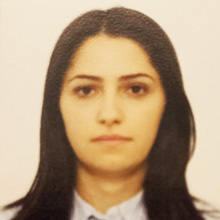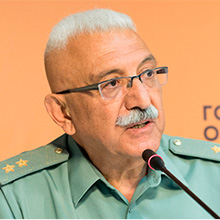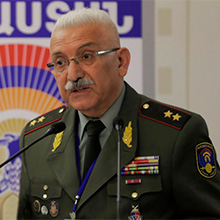Publications
An Impressive EU Aid Package to Armenia Does not Solve Yerevan’s Dilemma on Karabakh  By Benyamin Poghosyan, PhD, Chairman, Center for Political and Economic Strategic Studies
By Benyamin Poghosyan, PhD, Chairman, Center for Political and Economic Strategic Studies
The EU has thrown Armenia an economic lifeline, but Yerevan has a stark choice ahead: either to use its economic resources to modernise its military and ensure that the Armenian population left in Karabakh is protected, or to create conditions for the Armenians in Karabakh to gradually settle in Armenia.
The EU has always perceived the South Caucasus as a neighbouring area between Europe, the Middle East, and Central Asia. The South Caucasus was never part of the EU's vital interests, but the Europeans were not indifferent to the region's fate. After the collapse of the Soviet Union, the EU signed Partnership and Cooperation Agreements with South Caucasus Republics, and later included the region into the European Neighbourhood policy. The next phase in EU-South Caucasus relations was the launch of the Eastern Partnership initiative and the inclusion of Armenia, Azerbaijan, and Georgia into the program. READ MORE
Publications
Armenian Foreign Policy in the Context of the Transformation of Global Order  By Lilit Galstyan, Senior Research Fellow, Academy of Political Studies, Yerevan
By Lilit Galstyan, Senior Research Fellow, Academy of Political Studies, Yerevan
The end of the Cold War and the collapse of the Soviet Union have ushered in hopes of humanity's happy and harmonious future. The ideas such as "End of history" became very popular both within academic circles and with policymakers. There was a widespread belief that the entire planet would live under liberal democracy, and inter-state conflicts will become bad memories from history. However, the beginning of the XXI century crushed these hopes. Russia - West relations started to deteriorate after the 2004 Orange Revolution in Ukraine, while the 2014 Crimean crisis brought bilateral relations to the lowest point since the end of the Cold War. Meanwhile, the astonishing Chinese economic growth and the emergence of the multi-million middle class did not bring about political changes in China. READ MORE
Publications
Russia-Turkey Relations after the Karabakh War: A View from Armenia  By Benyamin Poghosyan, PhD, Chairman, Center for Political and Economic Strategic Studies
By Benyamin Poghosyan, PhD, Chairman, Center for Political and Economic Strategic Studies
Russia – Turkey relations are probably among the most discussed topics of Eurasian geopolitics. Experts and pundits are frantically searching for the correct terms to describe them – cooperation/competition, the marriage of convenience, and frenemies – all these words are used in endless efforts to grasp reality beneath the surface of high-level meetings and smiley handshakes of the leaders. The two countries interact in different regions – Middle East, Northern Africa, Black Sea basin, Central Asia, Western Balkans, and South Caucasus. In all these areas, they have overlapping and colliding interests, which have created a complex web of relationships. READ MORE
Publications
The Architecture of an Innovative Strategic Union Russia-Armenia  Hayk Kotanjian, Lieutenant General (ret), Professor of RA, RF, USA (strategic security studies), Lazarev Club Board Member
Hayk Kotanjian, Lieutenant General (ret), Professor of RA, RF, USA (strategic security studies), Lazarev Club Board Member
The strategic emphasis of the 4th session of the Lazarev Club has been imperatively demanded by the need to find and pursue new ways to prevent the loss of the Armenian national statehood. The end-product of those efforts should be built upon the coincidence of the strategic interests of security and sustainable development of our two fraternal peoples and allied states - Russia and Armenia. The existential importance of brainstorming on the problem of life and death of the state, as well as its innovative development, was exacerbated by the challenge of the upcoming formation of new authorities following the results of the early parliamentary elections. READ MORE
Publications
Armenia's June Elections May Lead to Further Uncertainty and Instability  By Benyamin Poghosyan, PhD, Chairman, Center for Political and Economic Strategic Studies
By Benyamin Poghosyan, PhD, Chairman, Center for Political and Economic Strategic Studies
Sunday's parliamentary elections in Armenia are hotly contested, and the electorate is actively engaged in the campaigning. But the election is likely to lead to further uncertainty and continued instability.
The official campaign for the 20 June 2021, early parliamentary elections in Armenia started on 7 June 2021. Twenty-five political entities are contesting the elections – 21 parties and four alliances (blocs). No election in the modern history of Armenia has seen such quantity and diversity of contenders. However, despite this impressive number, only a few participants have a real chance to overcome the threshold to enter Parliament – 5 percent for parties and 7 percent for alliances. READ MORE
Publications
Border Incident Forces Armenians to Rethink Relationship with Russia  By Benyamin Poghosyan, PhD, Chairman, Center for Political and Economic Strategic Studies
By Benyamin Poghosyan, PhD, Chairman, Center for Political and Economic Strategic Studies
The Azerbaijani military incursion into Armenian territory may have significant geopolitical implications. The muted reaction of the CSTO and Russia triggered another wave of anti-Russian sentiments in Armenia.
On 12 May 2021, news coming from the Syunik region shocked Armenian society. Several hundred Azerbaijani soldiers had crossed the Armenian border and penetrated up to 3.5 km into Armenian territory near the "Black Lake". The Armenian government did not confirm this immediately, however, late in the evening on the same day, Armenia’s Security Council convened in an extraordinary session, and the prime minister declared that Azerbaijani Armed forces had entered Armenian territory. READ MORE
Publications
Azerbaijan-Armenia Border Dispute – Could the Conflict Re-escalate?  By Fuad Shahbazov, Baku-based independent regional security and defence analyst
By Fuad Shahbazov, Baku-based independent regional security and defence analyst
Half a year after the Russian-brokered ceasefire agreement was signed between Azerbaijan and Armenia ending the 44-day war in Karabakh, peace in the complex region is not on the horizon. A new stage of discontent and harsh statements came last week after Azerbaijani Armed Forces reportedly crossed the border with Armenia in the Syunik province and advanced around 3 kilometres by Sev Lake. Yerevan dubbed this action as an explicit provocation and an attempt to occupy Armenian territory, whereas Baku denied the accusations, stating that Azerbaijani border guards established a military control point at the heights around the lake without advancing into Armenian territories. READ MORE
Publications
Armenia and Azerbaijan Should Restore their United Nations Recognized Borders  By Lieutenant General (Ret.) Hayk Kotanjian, D.Sc., Full Professor (Strategic Security Studies)
By Lieutenant General (Ret.) Hayk Kotanjian, D.Sc., Full Professor (Strategic Security Studies)
The dynamics of the peace and war in the region surrounding Armenia attracts the keen attention of all actors promoting their international security interests in the explosive geostrategic space of the Greater Middle East.
In this context, the resolution of the border dispute in Syunik, and the issue of delimitation and demarcation of the borders between Azerbaijan and Armenia, which is the focus of international attention, requires academic and expert assessment of the legality to consider the current line of contact between the Armed Forces of the Republic of Armenia and the Republic of Azerbaijan as the starting point in the negotiations. The negotiating parties and the OSCE Minsk Group Co-Chair states - the Russian Federation, the United States and France - should take into account the evidence of the following internationally valid arguments. READ MORE